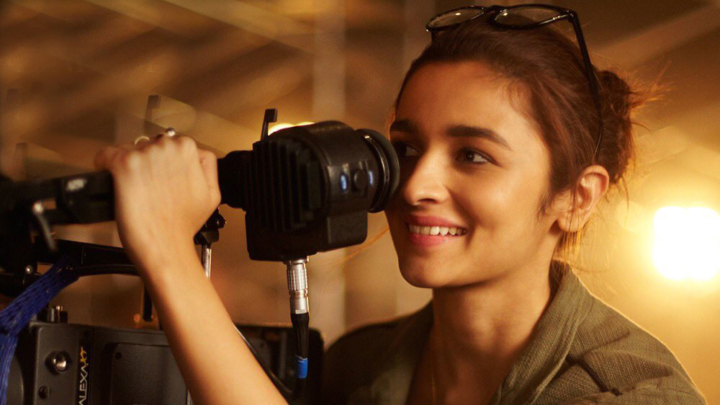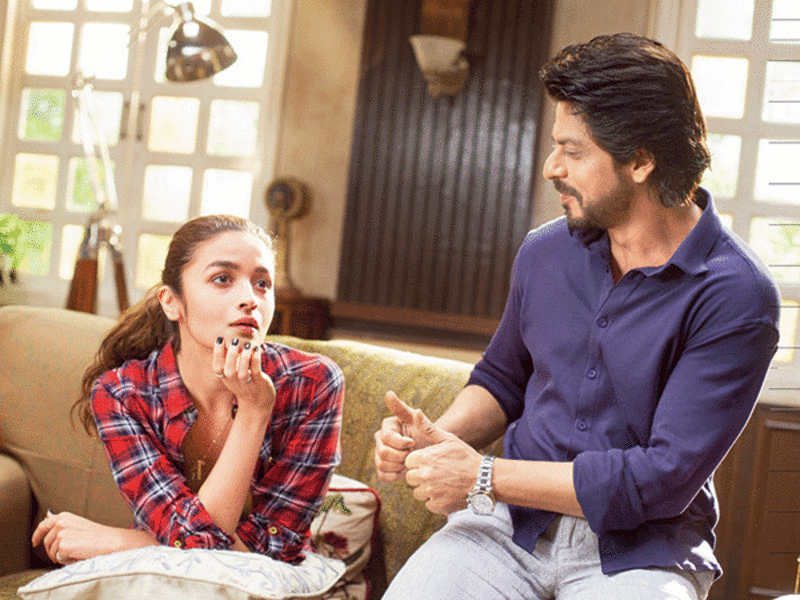Hello, today I am doing something which I haven’t done before- a movie review. But this movie review would not be about its direction, screenplay, acting, or cinematography. Rather it is about the main theme of the movie ‘Dear Zindagi’, i.e the stigma attached to mental health and misconceptions about therapy. I had watched the movie once, but for this blog I re-watched it and gained insights which I hadn’t initially.
For those of you who haven’t watched the movie, here is a quick summary for you to understand. The protagonist of the show, Kaira (played by Alia Bhatt) is in her late-20 and is struggling to make it big in the film industry as a cinematographer. She often falls in love but isn’t able to have a long-term relationship. Distressed, she decides to take a break and hesitantly visit her parents in Goa. But most of the time she is living with her best friend who also lives there.

One day, she happens to attend a conference on mental health where she sees Dr. Jehangir Khan (played by Shah Rukh Khan) answer a question with utmost humility that she decides to give therapy a try. The movie then goes on to reveal some hidden aspects of Kaira’s life which opens up in therapy. Dr. Khan beautifully helps her cope with those issues. The movie ends with Kaira making her dream short film.
I’ll begin with my interpretation of the issues that Kaira is dealing with (however, I am no psychologist yet, so something could go wrong), some of the stereotypes that were shown in the movie, some therapy concepts and a few flaws that I could find. I have also added a section on the beautiful dialogues that the movie portrays.
CHARACTER ANALYSIS OF KAIRA:
Kaira comes across as a normal young adult in her late 20’s, aspiring cinematographer who is stuck in her career, looking for opportunities for growth and also having love life issues as any adult in the late 20’s would. All her romantic relationships are short-lived. Along with that she also has some issues with her parents. The only support group she has is her two friends who have been with her through thick and thin. One would expect her to get over her problems with time, but that is actually not the case. There is something deep that’s disturbing her which later unfolds.

Jumping to, when she decides to seek help, she is quite resistant to open up. When asked about what is it that she wants help for, she says that she is unable to sleep- which can be interpreted as the adjustment issue. But actually there is more to it than a mere sleep disturbance.
As the session goes on, she gradually begins to finds answers to her questions. The therapist knows that there is something underlying which is the root of all problems, but waits for her to be ready to share it.
In the climax we come to know that she was separated from her parent in the initial years of childhood, and that love plays a significant role in how the child sees the world. This deprivation in the love/bond makes her have an avoidant attachment style with her parents. This attachment style is also reflected in her romantic relationships where she fears commitment because of the anticipation of being hurt. So she fears placing herself in relationships where there are chances of being hurt and therefore she leaves them before they can leave her.
To know more about the attachment style, click here
STEREOTYPES/ MISCONCEPTIONS:
There were instances when a few stereotypes regarding therapy were portrayed through meaningful dialogues which were actually meant to reduce them:
- There is this scene when one of the friends (Jackie) asks another friend why is he going to therapy? Pagal hai kya? Displaying the age-old belief that only crazy people go to the ‘dimag ka doctor’.
- Similar to the above misconception, Kaira’s apparent boyfriend Raghuvendra visits her and in the fight says ‘aisi kaunsi tragedy ho gai hai ki tum therapy le rahi ho’ implicating that only when the problem is out of your hands you should visit a therapist.
- Another scene very subtly displays a very grave topic of the lack of awareness of mental health profession, especially in the lower-socio economic strata of the society where Kaira is seen explaining her house-help Alka about who is a therapist/psychologist. After knowing what is actually is she says ‘fir toh sabko jana chahiye na’ which cracked me up and I cannot agree more.
- Another significant stereotype that people usually have about therapist is that they don’t have such issues in their own life which is absolutely untrue. So showing that Dr. Jehangir Khan was a divorcee and that it’s okay (as he is also a human being in the end) was a brave move on the part of the director.
THERAPY CONCEPTS:
Some of the basic concepts or skills of therapy that I could identify are as follows:
One of the misunderstandings that people might have about therapy is that it is about coming to the room and talking things out for any amount of time. This is not at all true. In fact it is a professional relationship and is for a fixed amount of time which is pre-decided. It usually ranges from 45 to 60 minutes. This was very well depicted in the movie where Dr Khan had a bell with a time limit. He was very professional in his approach in the sense that he would not allow Kaira any extra time, unless it was extremely urgent.

Sometimes, it so happens that the client, in this case Kaira, was resistant to open up. So during such time, the therapist uses their discretion to do a self-disclosure i.e he or she may disclose something that happened in their life to encourage the client to open up. This was beautifully done by Dr Khan where he reveals about his divorce which helps Kaira to open up about her relationships.
The two important skills that a therapist uses very often is:
1.Changing perspectives: helping the client see things from a different frame of reference. Often clients have a tendency to see things from a fixated view. This does not allow them to change their perspective and see things from a different angle. Something similar is happening with Kaira and Dr Khan again very efficiently uses this on various occasions.
My personal favorite is when he explains Kaira that it is so unfair to expect that one special romantic relationship will provide the individual with all that he or she requires. There are so many relationships that we share in our lifetime but when it comes to one special one, we often want that ‘one’ to be our spouse or partner. This helps her see her romantic relationship from different contexts.
2. The art of asking the right question at the right time: helps the client to go on a self-exploration process which ultimately helps the client the find answers for themselves. Sometimes it is a close ended question while other times it is an open ended one. To use which one, when is one of the important skills to be developed. Dr Khan seems to have mastered this art.

Another professional obligation which is a part of the therapist’s job is to be ethical. It includes- maintaining of the confidentiality, not imposing one’s own values on the client, not create dependency on the client, no other relations with the client outside the setting, among others. Dr Khan gets asked out on a coffee date by Kaira which was very well dealt and denied by him. I appreciate this film for taking these ethical considerations into account.
One of the difficult challenge for the therapist as well as the client is to end the relationship. Depending on the severity of the issue, the number of sessions differ. But usually it takes about 8-10 sessions. There are chances that this closure (which is the technical term for it) would be avoided by the client as they want to continue it because of the progress made.
However, autonomy of the client is the ultimate goal of therapy. And therefore communicating this to the client from the beginning is very significant. This was also very well depicted in the movie where Dr Khan does not deny this feeling of Kaira but acknowledges and appreciates her for handling it like a mature adult. And thus we see how therapy changes her life for the better.
CRITICISM:
Though the film beautifully captures the essence of therapy, there are certain things that worked against it. Some flaws that I was able to identify were:
- The physical setting in which the therapy takes place plays an important role. Ideally, the room has to be not overwhelming, noisy or distracting. However the setting in which Dr Khan takes his session was much cluttered. There were a lot of artifacts around which could serve as a distractor for the client.
- Secondly, the sessions cannot happen outside the room. However, Dr Khan is shown to be using his discretion to take sessions on a beach and even on a boat or cycling. I don’t agree with it, but there are people who take sessions at a coffee house. So be careful about it while seeking help.

- Lastly, Dr Khan cancels the appointment with a small post-it, that too when the client is on his door. This is not how it is done. The therapist has to inform the client before- hand if he or she is unable to take their appointments. And same goes for the client.
That’s it about the review of the film. To make a film on the less talked topic was definitely a brave move and to deliver it with such conviction and clarity is worthy of appreciation. Films play a very significant role in educating the viewers about that particular topic and ‘dear zindagi’ does that very well. Kudos to the entire team! And I hope they continue to do so with more such content driven cinema.
Ending this blog, with some beautiful dialogues from the film:
- “Don’t let your past blackmail your present, to ruin your beautiful future”
- “Kabhi kabhi hum mushkil rasta sirf is liye chunte hai, kyun ki humein lagta hai, important cheezein paane ke liye humein mushkil rasta apnana chahiye. Apne aap ko punish karna bahut zaroori samajhte hai. But why? Aasaan rasta kyun nahi chun sakte? Kya burai hai us mein? Khaas karke jab us mushkil ka saamna karne ke liye hum taiyaar hi nahi hai!”
- “Jab hum apne aap ko achhi tarah samajh lete hai, to dusre kya samajhte hai, it doesn’t matter. Not at all!”
- “Tum agar khul ke ro nahi sakogi, toh khul kar hass kaise paogi!”
- “Zindagi mein jab koi pattern banta ya koi aadat banti dikhai de na, toh uske baare mein achhi tarah se sochna chahiye, genius is about knowing when to stop.”
- “Hum itni kursiyan dekhte hai ek khareedne se pehle phir apna life partner choose karne se pehle opyions dekhne mein kya problem?”
- “Bachchpan main jab rona aata hai, toh bade bolte hai aasun pocho. Jab gussa aata hai, toh bade kehte hai smile taaki ghar ki shanti bani rahe. Nafrat karna chahe, toh ijazat nahi di. Aur jab pyaar karna chahe, toh pata chala ye saala emotional system hi gadbada gaya, kaam nahi kar raha, cannot function. Rona, gussa, nafrat kuch bhi khul ke express nahi karne diya. Ab pyaar kaise express kare?”
And, if you haven’t read my previous blog, here is the link
REFERENCES (FOR PICTURE):




2 Responses
Beautifully explained the whole concept via a movie .. haven’t watched the movie but can understand the theme behind it through your blog .
Really felt amazed to read it, explained just perfectly.
Hoping for many more.